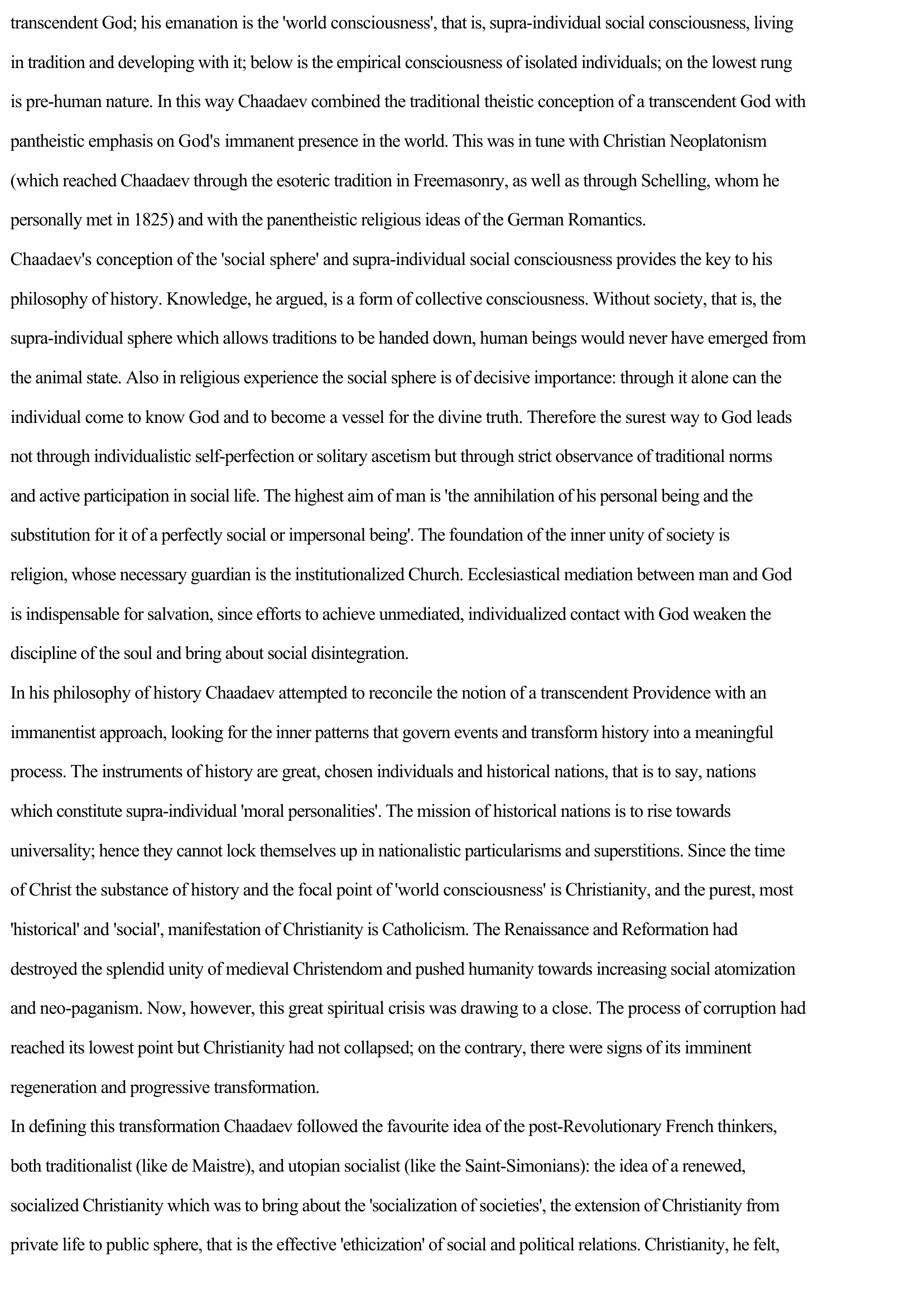Chaadaev, Pëtr Iakovlevich
Publié le 22/02/2012

Extrait du document
«
transcendent God; his emanation is the 'world consciousness' , that is, supra-individual social consciousness, living
in tradition and developing with it; below is the empirical consciousness of isolated individuals; on the lowest rung
is pre-human nature.
In this way Chaadaev combined the traditional theistic conception of a transcendent God with
pantheistic emphasis on God's immanent presence in the world.
This was in tune with Christian Neoplatonism
(which reached Chaadaev through the esoteric tradition in Freemasonry, as well as through Schelling, whom he
personally met in 1825) and with the panentheistic religious ideas of the German Romantics.
Chaadaev's conception of the 'social sphere' and supra-individual social consciousness provides the key to his
philosophy of history.
Knowledge, he argued, is a form of collective consciousness.
Without society, that is, the
supra-individual sphere which allows traditions to be handed down, human beings would never have emerged from
the animal state.
Also in religious experience the social sphere is of decisive importance: through it alone can the
individual come to know God and to become a vessel for the divine truth.
Therefore the surest way to God leads
not through individualistic self-perfection or solitary ascetism but through strict observance of traditional norms
and active participation in social life.
The highest aim of man is 'the annihilation of his personal being and the
substitution for it of a perfectly social or impersonal being' .
The foundation of the inner unity of society is
religion, whose necessary guardian is the institutionalized Church.
Ecclesiastical mediation between man and God
is indispensable for salvation, since efforts to achieve unmediated, individualized contact with God weaken the
discipline of the soul and bring about social disintegration.
In his philosophy of history Chaadaev attempted to reconcile the notion of a transcendent Providence with an
immanentist approach, looking for the inner patterns that govern events and transform history into a meaningful
process.
The instruments of history are great, chosen individuals and historical nations, that is to say, nations
which constitute supra-individual 'moral personalities' .
The mission of historical nations is to rise towards
universality; hence they cannot lock themselves up in nationalistic particularisms and superstitions.
Since the time
of Christ the substance of history and the focal point of 'world consciousness' is Christianity, and the purest, most
'historical' and 'social' , manifestation of Christianity is Catholicism.
The Renaissance and Reformation had
destroyed the splendid unity of medieval Christendom and pushed humanity towards increasing social atomization
and neo-paganism.
Now, however, this great spiritual crisis was drawing to a close.
The process of corruption had
reached its lowest point but Christianity had not collapsed; on the contrary, there were signs of its imminent
regeneration and progressive transformation.
In defining this transformation Chaadaev followed the favourite idea of the post-Revolutionary French thinkers,
both traditionalist (like de Maistre), and utopian socialist (like the Saint-Simonians): the idea of a renewed,
socialized Christianity which was to bring about the 'socialization of societies' , the extension of Christianity from
private life to public sphere, that is the effective 'ethicization' of social and political relations.
Christianity, he felt,.
»
↓↓↓ APERÇU DU DOCUMENT ↓↓↓

































